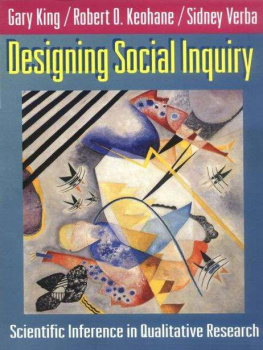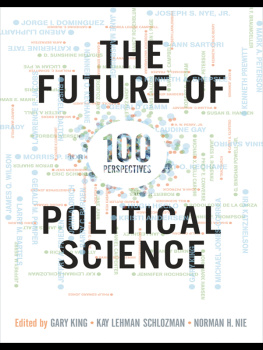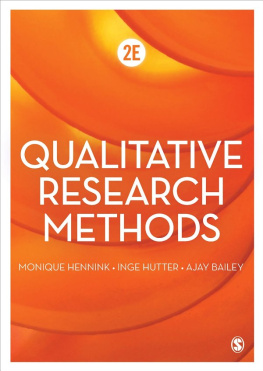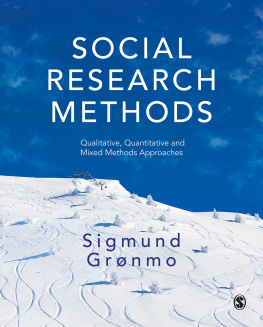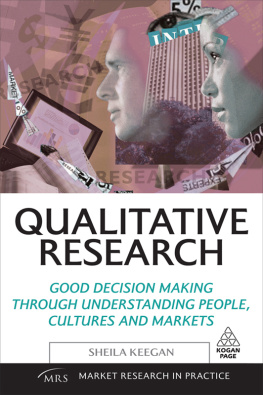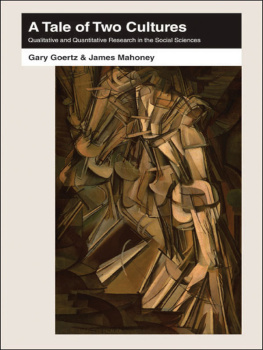Table of Contents
Copyright 1994 by Princeton University Press Published by Princeton University Press, 41 William Street, Princeton, New Jersey 08540
In The United Kingdom: Princeton University Press,
Chichester, West Sussex
All Rights Reserved
Library of Congress Cataloging-in-Publication Data
King, Gary.
Designing social inquiry : scientific inference in qualitiative research / Gary King, Robert O. Keohane, Sidney Verba. p. cm.
Includes bibliographical references and index
ISBN 0-691-03470-2 (cloth : alk. paper) ISBN 0-691-03471-0 (pbk. : alk. paper)
1. Social sciencesMethodology. 2. Social sciencesResearch. 3. Inference
I. Keohane, Robert Owen.
II. Verba, Sidney. III. Title.
H61.K5437 1994 93-39283
300.72dc20 CIP
This book has been composed in Adobe Palatino
Princeton University Press books are printed on acid-free paper and meet the guidelines for permanence and durability of the Committee on Production Guidelines for Book Longevity of the Council on Library Resources
Printed in the United States of America
10 9 8 7 6
Preface
IN THIS BOOK we develop a unified approach to valid descriptive and causal inference in qualitative research, where numerical measurement is either impossible or undesirable. We argue that the logic of good quantitative and good qualitative research designs do not fundamentally differ. Our approach applies equally to these apparently different forms of scholarship.
Our goal in writing this book is to encourage qualitative researchers to take scientific inference seriously and to incorporate it into their work. We hope that our unified logic of inference, and our attempt to demonstrate that this unified logic can be helpful to qualitative researchers, will help improve the work in our discipline and perhaps aid research in other social sciences as well. Thus, we hope that this book is read and critically considered by political scientists and other social scientists of all persuasions and career stagesfrom qualitative field researchers to statistical analysts, from advanced undergraduates and first-year graduate students to senior scholars. We use some mathematical notation because it is especially helpful in clarifying concepts in qualitative methods; however, we assume no prior knowledge of mathematics or statistics, and most of the notation can be skipped without loss of continuity.
University administrators often speak of the complementarity of teaching and research. Indeed, teaching and research are very nearly coincident, in that they both entail acquiring new knowledge and communicating it to others, albeit in slightly different forms. This book attests to the synchronous nature of these activities. Since 1989, we have been working on this book and jointly teaching the graduate seminar Qualitative Methods in Social Science in Harvard Universitys Department of Government. The seminar has been very lively, and it often has spilled into the halls and onto the pages of lengthy memos passed among ourselves and our students. Our intellectual battles have always been friendly, but our rules of engagement meant that agreeing to disagree and compromising were high crimes. If one of us was not truly convinced of a point, we took it as our obligation to continue the debate. In the end, we each learned a great deal about qualitative and quantitative research from one another and from our students and changed many of our initial positions. In addition to its primary purposes, this book is a statement of our hard-won unanimous position on scientific inference in qualitative research.
We completed the first version of this book in 1991 and have revised it extensively in the years since. Gary King first suggested that we write this book, drafted the first versions of most chapters, and took the lead through the long process of revision. However, the book has been rewritten so extensively by Robert Keohane and Sidney Verba, as well as Gary King, that it would be impossible for us to identify the authorship of many passages and sections reliably.
During this long process, we circulated drafts to colleagues around the United States and are indebted to them for the extraordinary generosity of their comments. We are also grateful to the graduate students who have been exposed to this manuscript both at Harvard and at other universities and whose reactions have been important to us in making revisions. Trying to list all the individuals who were helpful in a project such as this is notoriously hazardous (we estimate the probability of inadvertently omitting someone whose comments were important to us to be 0.92). We wish to acknowledge the following individuals: Christopher H. Achen, John Aldrich, Hayward Alker, Robert H. Bates, James Battista, Nathaniel Beck, Nancy Burns, Michael Cobb, David Collier, Gary Cox, Michael C. Desch, David Dessler, Jorge Domnguez, George Downs, Mitchell Duneier, Matthew Evangelista, John Ferejohn, Andrew Gelman, Alexander George, Joshua Goldstein, Andrew Green, David Green, Robin Hanna, Michael Hiscox, James E. Jones, Sr., Miles Kahler, Elizabeth King, Alexander Kozhemiakin, Stephen D. Krasner, Herbert Kritzer, James Kuklinski, Nathan Lane, Peter Lange, Tony Lavelle, Judy Layzer, Jack S. Levy, Daniel Little, Sean Lynn-Jones, Lisa L. Martin, Helen Milner, Gerardo L. Munck, Timothy P. Nokken, Joseph S. Nye, Charles Ragin, Swarna Rajagopalan, Shamara Shantu Riley, David Rocke, David Rohde, Frances Rosenbluth, David Schwieder, Collins G. Shackelford, Jr., Kenneth Shepsle, Daniel Walsh, Carolyn Warner, Steve Aviv Yetiv, Mary Zerbinos, and Michael Zrn. Our appreciation goes to Steve Voss for preparing the index, and to the crew at Princeton University Press, Walter Lippincott, Malcolm DeBevoise, Peter Dougherty, and Alessandra Bocco. Our thanks also go to the National Science Foundation for research grant SBR-9223637 to Gary King. Robert O. Keohane is grateful to the John Simon Guggenheim Memorial Foundation for a fellowship during the term of which work on this book was completed.
We (in various permutations and combinations) were also extremely fortunate to have had the opportunity to present earlier versions of this book in seminars and panels at the Midwest Political Science Association meetings (Chicago, 2-6 April 1990), the Political Methodology Group meetings (Duke University, 18-20 July 1990), the American Political Science Association meetings (Washington, D.C., 29 August- 1 September 1991), the Seminar in the Methodology and Philosophy of the Social Sciences (Harvard University, Center for International Affairs, 25 September 1992), the Colloquium Series of the Interdisciplinary Consortium for Statistical Applications (Indiana University, 4 December 1991), the Institute for Global Cooperation and Change seminar series (University of California, Berkeley, 15 January 1993), and the University of Illinois, Urbana-Champaign (18 March 1993).
Gary King
Robert O. Keohanne
Sidney Verba
Cambridge, Massachusetts
CHAPTER 1
The Science in Social Science
1.1 INTRODUCTION
THIS BOOK is about research in the social sciences. Our goal is practical: designing research that will produce valid inferences about social and political life. We focus on political science, but our argument applies to other disciplines such as sociology, anthropology, history, economics, and psychology and to nondisciplinary areas of study such as legal evidence, education research, and clinical reasoning.
This is neither a work in the philosophy of the social sciences nor a guide to specific research tasks such as the design of surveys, conduct of field work, or analysis of statistical data. Rather, this is a book about research design: how to pose questions and fashion scholarly research to make valid descriptive and causal inferences. As such, it occupies a middle ground between abstract philosophical debates and the hands-on techniques of the researcher and focuses on the essential logic underlying all social scientific research.

